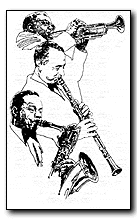![]()
![[ OPINIONS ]](/images/fall97/opinionsf97.gif)
![]()
By Bradford J. Sennig
Arizona Daily Wildcat January 15, 1998
Music underscored
![[Picture]](04_2_i.gif)
Bradford J. Sennig |
I like to tell people that I'm a failed musician. When they ask me why I
write poetry I say, "Because the fifth string on my guitar broke."
Actually, I write poetry because the pen is the instrument I've been practicing
daily since I was five and is, therefore, the only chance for any of my
creative energies to achieve a state of music.
Music is the one art form to which every other art aspires; it's the only art form that doesn't try to achieve the virtuosity of other arts. It tries only to "imitate nature," or to relieve human thoughts of mortality, or to initiate a communication with God.
On "The Simpsons," Bleeding Gums Murphy tells saxophonist Lisa Simpson, "Music is like a fire inside your belly that has to come out your mouth - so you better stick an instrument in front of it." This quotation isn't about defining music, but about the way we define music: in "likes."
Music is like jumping up and down or like climbing a mountain or like making love. And all of these "likes" merely emphasize the margin between metaphor and understanding.
Words really can't capture what music means but the attempt is, in abstract ways, to say "I think music could conceivably move me enough to kill myself," or "Listening to Coltrane's 'A Love Supreme' has convinced me that God exists." Music is a substitution for prayer.
In San Francisco, there is an African Orthodox Church which has in fact sainted jazz saxophonist John Coltrane.
On Sundays the congregation brings instruments and the Bishop comes out of his chambers with a tenor saxophone and a soprano saxophone and the church drummer starts crashing into the cymbals with long pine sticks. Then everyone gets up from their pews and dances.
"Amens" are serviced into the air. A priest bumps theskin of a bongo. The floor itself seems to reverberate its own dance. Then the Bishop hands me a tambourine.
It seems natural not to thank him but to show my appreciation in action, without abstract conveyances like words but with the pure-speaking expression of my instrument. I shook that tambourine like a real Bee Gee. All this significant music lasted about two hours before the Bishop stepped up to the podium, his lips numb from spitting into a saxophone. And I swear I barely understood a word that man said.

If you ask a musician to speak intelligently about their art form, their mouths emit only a series of abstractions, utilizing the words "dude" and "cool" in abundance. They seem to make sense only when they've got something in their hands to produce noise with.
Anyone who went to see jazz pianist Herbie Hancock play at Centennial Hall and tried to figure out what the hell he was talking about between tunes will understand how having the voice of music can make it seem unimportant to be able to speak Human anymore.
Duke Ellington said "There is no language which God does not understand." As languages go, however, music is the one that He can hum along to. Our whispers turn into odes when we let a symphony speak for us.
I don't know how it goes about affecting me, or if there's anyone beside us listening, but when I hear good music I feel like there's something new about me that isn't me and won't be about me anymore when the song is over. That's music, for me, defined.
Brad Senning is a senior majoring in American literature and creative writing.



